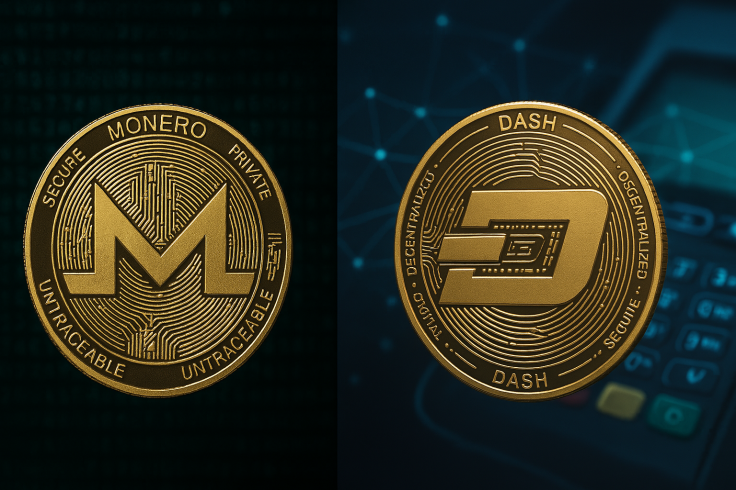Monero vs. Dash: Which Is the Better Privacy Coin?
As digital privacy becomes a top priority, Monero and Dash take centre stage in the debate over default vs. optional anonymity in cryptocurrency.

Privacy coins are becoming more trendy as financial surveillance concerns grow stronger. Monero (XMR) and Dash (DASH), two of the most well-known privacy coins, take different approaches to providing secure and untraceable transactions. While both are more private than Bitcoin, their technology, adoption, and anonymity solutions differ.
Getting to Know Monero
Monero has been designed with financial privacy in mind from the very start. Unlike Bitcoin, where transactions are publicly recorded on an open blockchain, Monero employs ring signatures, stealth addresses, and RingCT (Ring Confidential Transactions) to conceal transaction information.
- Ring Signatures mix a sender's transaction with other transactions, making it practically impossible to identify the source of funds.
- Stealth Addresses cause recipient addresses never to be publicly linked with transactions.
- RingCT hides the transaction amounts so that an outside party is not aware of how much XMR is being sent.
Thanks to these default privacy aspects, Monero remains the choice of anyone who requires complete anonymity. All Monero network transactions are private by default and free from selective disclosure.
Dash: A Hybrid Approach to Privacy
Dash was initially a fork of Bitcoin but evolved into a privacy-focused cryptocurrency with optional anonymity. Dash's PrivateSend combines a user's transactions with those of other users, thus creating a layer of obfuscation. Unlike in Monero, Dash transactions are traceable unless the user explicitly chooses PrivateSend.
Dash has a two-tier network of master nodes that enable its instantness and privacy. This has stirred alarm about centralisation because the number of master nodes holds authoritative power over many of the network's details.
Regulatory pressure also led exchanges to delist Dash, categorising it as a privacy coin, although it has optional privacy features that are not required by default.
Adoption and Use Cases
While Dash and Monero strongly focus on privacy, they differ in use and adoption.
- Monero is extensively utilised in anonymous communities as it has anonymous defaults. It is generally the go-to option for individuals in regions with stringent money controls or where financial privacy matters.
- Dash promoted itself as the digital equivalent of cash, emphasising quick transactions and merchant adoption. While it does include privacy features, they are optional and, therefore, more palatable to businesses and regulators.
Monero and Dash can both be traded with other cryptocurrencies, allowing users to switch comfortably between them. If you are looking to trade Bitcoin with a private asset, a preferable choice is BTC to XMR, which allows you to have more anonymity in the transaction.
Regulatory Challenges and Future Outlook
Privacy coins have also had to contend with increasing government and regulatory scrutiny. Monero, for its anonymous transactions, has been declined by some exchanges in countries with strict financial laws. Despite that, its decentralised nature and community-driven ethos power its persistence.
Dash, nevertheless, has been more compliant by offering privacy options. This has, however, raised the question of whether it can be termed a pure privacy coin.
Regardless of regulatory pressure, privacy coins remain in demand. As governments push for more financial transparency, privacy coins like Monero and Dash will stay at the frontline of the emerging digital economy.
Which Privacy Coin is Best?
- If absolute financial anonymity is an issue, Monero is the preferable choice. Its default privacy model anonymises all transactions and is among the most privacy-oriented coins available.
- If speed, usability, and optional anonymity are of the utmost concern, Dash is a well-rounded choice. Optional PrivateSend allows users to choose if and when they would like anonymity, and InstantSend offers fast transaction times.
Dash and Monero both have their own roles in cryptocurrency. While Monero is private, Dash is a more functional digital currency alternative with quicker transactions and wider acceptance. The real choice between the two is whether privacy should be by default or an option.
© Copyright IBTimes 2025. All rights reserved.


















